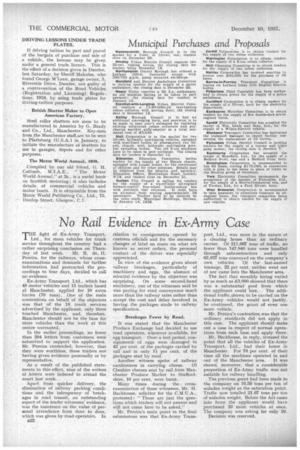No Rail
Page 4

If you've noticed an error in this article please click here to report it so we can fix it.
Evidence in Ex-Army Case T"fight of Ex-Army. Transport, Ltd., for more vehicles for trunk service throughout the country had a rather surprising conclusion on Thursday of last week. Mr. B. de, H. Pereira. for the railways, whose crossexaminations and demands for further information had protracted the proceedings to four days, decided to call no evidence.
Ex-Army Transport, Ltd., which has 48 motor-vehicles and 13 trailers based at Manchester, applied for 10 extra lorries (70 tons). One of the main contentions on behalf of the objectors was that of the 18 trunk services advertised by the applicant, only three touched Manchester, and, therefore, Manchester should not be the base for more vehicles than the work at this centre warranted.
In the earlier proceedings, no fewer than 204 letters from customers were submitted to support the application. Mr. Pereira contended, however, that they were worthless, these traders not having given evidence personally or by representative.
As a result of the published statements to this effect, nine of the writers of letters were induced to attend the court last week.
Apart from quicker delivery, the elimination of railway packing conchtions and the infrequency of breakages in road transit, an outstanding aspect of the trader witnesses' evidence, was the insistence on the value of personal attendance from door to door, which was given by road operators. In B22 relation to consignments opened by customs officials and for the necessary changes of label en route on what are known as secret orders, the personal contact of the driver was especially appreciated,
In view of the evidence given about railway breakages, particularly of machinery and eggs, the absence of rebuttal evidence by the objectors was surprising. On some second-hand machinery, one of the witnesses said he was paying for road conveyance much more than the railway rates rather than I accept the cost and delay involved in having the packages made to railway specification.
Breakages Fewer by Road.
It was stated that the Manchester Produce Exchange hdd decided to use road operators, wherever available, for egg transport. Over a test period, consignments of eggs were damaged in 42 per cent, of the packages carried by rail and in only ij per cent, of the packages sent by road.
Another witness spoke of railway
carelessness in carrying cheese. Of Cheshire cheeses sent by rail from Manchester Produce Market to Staffordshire, 10 per cent, were burst.
Many times during the _ crossexamination of these witneSses, Mr. H. Backhouse, solicitor for the C.M.U.A., protested: " Those are just the questions which traders will not answer and will not come here to be asked."
Mr. Pereira's main point in the final submissions was that Ex-Army Trans
port, Ltd., was more in the nature ot a clearing house than an ordinary carrier: Of 211,667 tons of traffic, no fewer than 1.47,840 tons were handled through subcontractors and only 63,827 tons conveyed on the company's own vehicles. Of the last-named tonnage, 22 per cent, neither went oat of nor came into the Manchester area.
• The .fact that monthly hiring varied by as much as £3,000 showed that there Was a -substantial pool from which
the applicant could hire. . The additional traffic shown to be carried on the Ex-Army vehicles would not justify, he continued, the grant of even one more 'vehicle, Mr. Pereira's contention was that the ordinary standards did not apply in' this case. The applicant should make, out a case in respect of normal operations from each base and apply there. Mr. Baekhouse, in reply, stressed the point that all the vehicles of Ex-Army Transport, Ltd., had their home in Manchester. For 78 per cent, of their time all the machines operated in and out of the Manchester area. It was shown, moreover, that a considerable proportion of Ex-Army traffic was not suitable for railway handling.
The previous grant had been made to the company on 16.59 tons per ton of unladen weight as the saturation point,.
Traffic now totalled 21,67 tons per ton of unladen weight. Before.the Act came into force the applicant would have purchased 20 more vehicles at once. The company was asking for only 10. Decision was reserved.




























